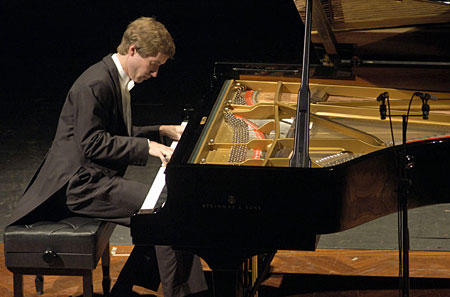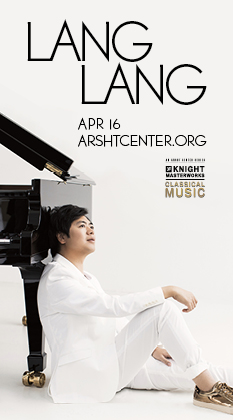Pianist Lugansky provides sterling advocacy for Rachmaninoff

Nikolai Lugansky performed works of Chopin and Rachmaninoff Tuesday night at Gusman Concert Hall, presented by Friends of Chamber Music.
Nikolai Lugansky is the movie image of the concert pianist. Tall, lean and dark-haired, dressed in immaculate white tie and tails, the Russian virtuoso plays with old-fashioned dramatics at the keyboard. And he performed a real pianist’s program Tuesday at the University of Miami’s Gusman Hall, giving a recital of Chopin and Rachmaninoff for the Friends of Chamber Music of Miami series.
Although he was a sensitive interpreter of Chopin, it was in the second half, devoted to Rachmaninoff’s Piano Sonata No. 1, that he played best. It’s hard to understand why this work is performed so much less frequently than the composer’s second piano sonata. The First Sonata is classic Rachmaninoff, marked by the composer’s voice in every bar, with long lyrical melodies, complex harmonies, moments of bleak loneliness and episodes of keyboard-pounding dramatics.
On paper the Rachmaninoff work is probably more difficult than the preceding Chopin works, but it seemed to come more easily to Lugansky. As he played, leaning into the keyboard at soft passages, allowing his hands to rise high above the piano in fortissimo chords, he seemed freer and less constrained, putting more of himself into the work.
While his account of Chopin’s Scherzo in E Major seemed fluent but episodic, he performed with a firm sense of the architecture of the three movements of the Rachmaninoff. The elaborate sonic embroideries of the first movement came off with effortless technical control and a strong sense of the long line, with every passage rooted in the larger whole. In the last movement, he drew an orchestral sonority from the piano, while never banging, and used a highly articulated touch at the keyboard that prevented Rachmaninoff’s fistfuls of notes from becoming blurred.
In the first half, he played with the versatility demanded by a broad selection of Chopin’s works. He knew how to effectively deploy rubato – freeing the music from the metronome to make it slow down or speed up as necessary – as in the ascending arpeggios of the Fantasie in F Minor. And he could play with clipped precision, as in the rapid sections of the E Major Scherzo, which he attacked fearlessly. The pianist brought ferocious power to the famous Polonaise in A-flat Major.
But Lugansky was at his best in lyric works such as the Prelude in C-sharp Minor, in which he made every note sing, even in the winding left-hand accompaniment, in the rich harmonies of the Nocturne in D-flat Major, and in the warmly melodic middle section of the E Major Scherzo.
Lugansky earned a standing ovation and several curtain calls. As encores, he gave more Rachmaninoff: A light-fingered account of the composer’s arrangement of Fritz Kreisler’s Liebesleid and a crystalline performance of the Prelude Op. 32 No. 12.
Posted in Performances
One Response to “Pianist Lugansky provides sterling advocacy for Rachmaninoff”
Leave a Comment
Wed Apr 6, 2011
at 11:12 am
1 Comment






Posted Apr 08, 2011 at 12:49 pm by Svetlana Chlenova
Nikolai Lugansky: “Rachmaninoff is my favourite composer. To be favourite does not mean to be the best. Being asked to define the best composers, I would name, for example: Bach, Mozart, Chopin and Rachmaninoff. The most favourite for me is that I love most of all– not because it is the best, but just because it is necessary for my soul”.
Rachmaninoff is a subject of the pianist’s love and care for. Lugansky is an outstanding contributor into the restoration of the memorial estate of Ivanovka, Rachmaninoff’s beloved place in Russia where the composer long lived and wrote much. In Ivanovka Nikolay Lugansky gives charitable concerts since 2001. Since 2002 he gives a master class for young pianists of the Tambov, Voronezh, Saratov, Volgograd areas.
I suppose that Nikolai Lugansky is the best Rachmaninoff’s performer because he feels and lives in the ways of this the most Russian composer